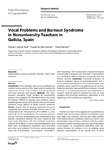Mostrar o rexistro simple do ítem
Vocal Problems and Burnout Syndrome in Nonuniversity Teachers in Galicia, Spain
| dc.contributor.author | García-Real, Teresa J. | |
| dc.contributor.author | Díaz Román, Tomás M. | |
| dc.contributor.author | Mendiri, Paula | |
| dc.date.accessioned | 2023-12-26T11:06:15Z | |
| dc.date.issued | 2023-07-24 | |
| dc.identifier.citation | García-Real TJ, Díaz-Román TM, Mendiri P. VOCAL PROBLEMS AND BURNOUT SYNDROME IN NONUNIVERSITY TEACHERS IN GALICIA, SPAIN. Folia Phoniatrica et Logopaedica : Official Organ of the International Association of Logopedics and Phoniatrics (IALP). 2023 Jul:1. DOI: 10.1159/000531982. PMID: 37487470. | es_ES |
| dc.identifier.issn | 1421-9972 | |
| dc.identifier.uri | http://hdl.handle.net/2183/34635 | |
| dc.description | [Abstract] Introduction: Voice disorders and burnout syndrome are common among teachers. This study aimed to explore the relationship among vocal problems, burnout syndrome, and some personal work factors. Methods: This cross-sectional descriptive study enrolled 90 nonuniversity teachers who completed the Multidimensional Vocal Scale for Teachers (EVM-D) to evaluate vocal problems and an adapted Spanish version of the Maslach Burnout Inventory-Educators Survey (MBI-ES) to detect burnout syndrome. Results: Overall, 16% of teachers expressed symptoms compatible with burnout, and 60% of them were in the interval above the 75th percentile of the EVM-D, i.e., they had a high risk of vocal problems. An association between burnout and more vocal problems was established among teachers, particularly between the vocal symptoms and vocal abuse dimensions with the emotional exhaustion subscale of the MBI-ES. A history of anxiety/depression and fewer years of professional experience were associated with more vocal problems. The burnout group perceived more “loss of vocal power,” “vocal fatigue,” “vocal effort,” and “hoarseness.” Vocal abuse items received the highest scores of EVM-D. However, only “shouting” in the classroom was significantly different between the groups with and without burnout. Conclusion: Emotional exhaustion of burnout syndrome, history of anxiety/depression, and a shorter professional experience were associated with vocal problems, which could limit the performance of teachers. Reducing classroom noise, establishing strategies to avoid shouting, or strengthening personal accomplishments in teachers could be useful in breaking the cycle of vocal problems and emotional exhaustion, particularly at the beginning of their professional experience. | es_ES |
| dc.language.iso | eng | es_ES |
| dc.publisher | Karger | es_ES |
| dc.relation.uri | https://doi.org/10.1159/000531982 | es_ES |
| dc.rights | © 2023 S. Karger AG, Basel | es_ES |
| dc.subject | Vocal problems | es_ES |
| dc.subject | Burnout syndrome | es_ES |
| dc.subject | Teachers | es_ES |
| dc.subject | Stress | es_ES |
| dc.subject | Vocal risk factor | es_ES |
| dc.title | Vocal Problems and Burnout Syndrome in Nonuniversity Teachers in Galicia, Spain | es_ES |
| dc.type | info:eu-repo/semantics/article | es_ES |
| dc.rights.access | info:eu-repo/semantics/embargoedAccess | es_ES |
| dc.date.embargoEndDate | 9999-99-99 | es_ES |
| dc.date.embargoLift | 10007-06-07 | |
| UDC.journalTitle | Folia Phoniatrica et Logopaedica | es_ES |
Ficheiros no ítem
Este ítem aparece na(s) seguinte(s) colección(s)
-
GI-EILOE - Artigos [17]






